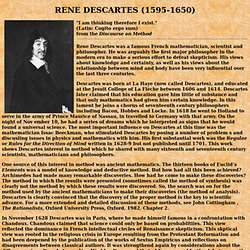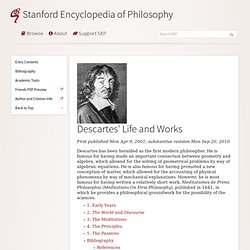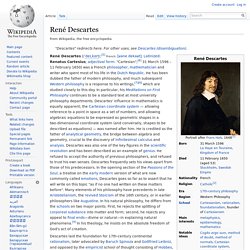

RENE DESCARTES. "I am thinking therefore I exist.

" (Latin: Cogito ergo sum) from the Discourse on Method Rene Descartes was a famous French mathematician, scientist and philosopher. He was arguably the first major philosopher in the modern era to make a serious effort to defeat skepticism. His views about knowledge and certainty, as well as his views about the relationship between mind and body have been very influential over the last three centuries. Descartes was born at La Haye (now called Descartes), and educated at the Jesuit College of La Flèche between 1606 and 1614. One source of this interest in method was ancient mathematics.
In November 1628 Descartes was in Paris, where he made himself famous in a confrontation with Chandoux. In Holland Descartes produced a scientific work called Le Monde or The World which he was about to publish in 1634. Descartes last work Les Passions de l'áme was written as a result of the correspondence which Descartes carried on with Princess Elisabeth of Bohemia. Descartes' Life and Works. First published Mon Apr 9, 2001; substantive revision Mon Sep 20, 2010 Descartes has been heralded as the first modern philosopher.

He is famous for having made an important connection between geometry and algebra, which allowed for the solving of geometrical problems by way of algebraic equations. He is also famous for having promoted a new conception of matter, which allowed for the accounting of physical phenomena by way of mechanical explanations. However, he is most famous for having written a relatively short work, Meditationes de Prima Philosophia (Meditations On First Philosophy), published in 1641, in which he provides a philosophical groundwork for the possibility of the sciences. 1.
Descartes was born in La Haye on March 31, 1596 of Joachim Descartes and Jeanne Brochard. Descartes' Law Thesis In 1618, at the age of twenty-two, he enlisted in the army of Prince Maurice of Nassau. While stationed at Breda, Descartes met Isaac Beeckman (1588–1637). 2. 3. 4. René Descartes. Descartes laid the foundation for 17th-century continental rationalism, later advocated by Baruch Spinoza and Gottfried Leibniz, and opposed by the empiricist school of thought consisting of Hobbes, Locke, Berkeley, and Hume.

Leibniz, Spinoza and Descartes were all well versed in mathematics as well as philosophy, and Descartes and Leibniz contributed greatly to science as well. His best known philosophical statement is "Cogito ergo sum" (French: Je pense, donc je suis; I think, therefore I am), found in part IV of Discourse on the Method (1637 – written in French but with inclusion of "Cogito ergo sum") and §7 of part I of Principles of Philosophy (1644 – written in Latin). Early life[edit] Descartes was born in La Haye en Touraine (now Descartes), Indre-et-Loire, France. When he was one year old, his mother Jeanne Brochard died. In his book, Discourse On The Method, he says "I entirely abandoned the study of letters. Visions[edit] Work[edit] Descartes lived on Westermarkt 6 (on the left) Descartes, René: Overview
René Descartes is often credited with being the “Father of Modern Philosophy.” This title is justified due both to his break with the traditional Scholastic-Aristotelian philosophy prevalent at his time and to his development and promotion of the new, mechanistic sciences. His fundamental break with Scholastic philosophy was twofold. First, Descartes thought that the Scholastics’ method was prone to doubt given their reliance on sensation as the source for all knowledge.
Second, he wanted to replace their final causal model of scientific explanation with the more modern, mechanistic model. Descartes attempted to address the former issue via his method of doubt. Once this conclusion is reached, Descartes can proceed to rebuild his system of previously dubious beliefs on this absolutely certain foundation.
Table of Contents 1. René Descartes was born to Joachim Descartes and Jeanne Brochard on March 31, 1596 in La Haye, France near Tours. Little is known of Descartes’ life from 1614-1618.